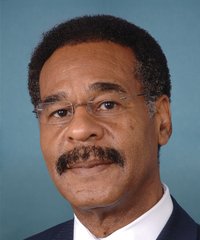
Emanuel Cleaver, II is now serving his ninth term representing Missouri's Fifth Congressional District, the home district of President Harry Truman. He is a member of the House Committee on Financial Services; Chair of the Subcommittee on Housing, Community Development, and Insurance; member of Subcommittee on Investor Protection, Entrepreneurship, and Capital Markets; member of Subcommittee on Oversight and Investigations; member of the House Committee on Homeland Security; member of the Subcommittee on Border Security, Facilitation, and Operations; and member of the Select Committee on the Modernization of Congress.
Having served for twelve years on the city council of Missouri's largest municipality, Kansas City, Cleaver was elected as the city's first African American Mayor in 1991.
Given our current economic climate, and the mounting national debt, it is imperative that Congress take appropriate action to protect future generations. This is an ongoing debate that requires the cooperation of both parties. I remain committed to responsibly reducing the deficit, but not at the cost of critical programs that support our most vulnerable communities. We cannot only rely on hard working American families to continue making the majority of the sacrifices. Irresponsible cuts not only weaken our nation's full recovery, but also weaken our ability to create jobs. We must address our growing deficit in a strategic and comprehensive manner.
Many proposals to change our federal budget and our tax code have been offered recently. Last year, I voted in favor of H.R. 8, the American Taxpayer Relief Act of 2012, also known as the legislation to avert the fiscal cliff. This bill, now law, was not perfect, but I believe it is in reaching out and finding compromise that we find a way to move forward, keep our economy on the right track, and increase employment for hard-working people in Missouri’s Fifth District.
This law permanently extended tax cuts for the middle-class, extended credit for working families, and provided additional measures to protect families and promote economic growth. The law required millionaires and billionaires to pay their fair share to reduce the deficit, through a combination of permanent tax rate increases and reduced tax benefits. And this agreement ensured that we can continue to make investments in education, clean energy, and manufacturing that create jobs and strengthen the middle class. While these are broad and complex issues, ultimately I believe we need to create jobs, reduce the deficit, help small businesses grow, and support the middle-class. I support closing loopholes that help companies ship jobs overseas, encouraging businesses to keep and create well-paying jobs here, and investing in our country’s infrastructure and education.
I support ending the damaging sequester, and I have opposed sequestration since it first came before the House Floor for a vote. As you may know, sequestration is a process of automatic, largely across-the-board spending reductions. Sequestration has its origins in the Budget Control Act, which I did not support. It has always been avoidable, and in fact was created to be so awful and disastrous that it would encourage Congress to come together to avoid it. Our economy is still recovering, and these drastic and dangerous cuts have hurt children, seniors, small businesses, public servants, and men and women who so proudly and selflessly wear a uniform to protect our country. We need to replace these arbitrary, unnecessary cuts and enact legislation to create jobs, strengthen the middle class, grow the economy, and responsibly reduce the deficit. I have – and I will continue – to call on all of my colleagues to do what is right for our nation’s economy, and for the hardworking families in my district.
Overall, we must expand economic growth for all, make critical investments in our future, and reduce the deficit. We must put forth a budget which does not provide for tax breaks for the wealthy and big business on the backs of hard working American families and our most vulnerable communities.